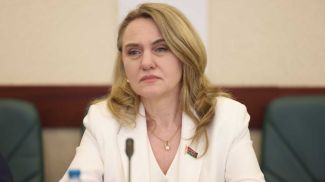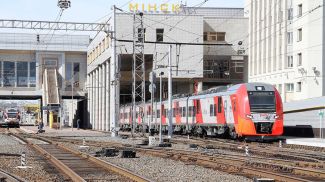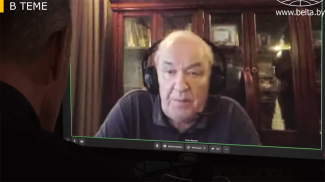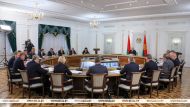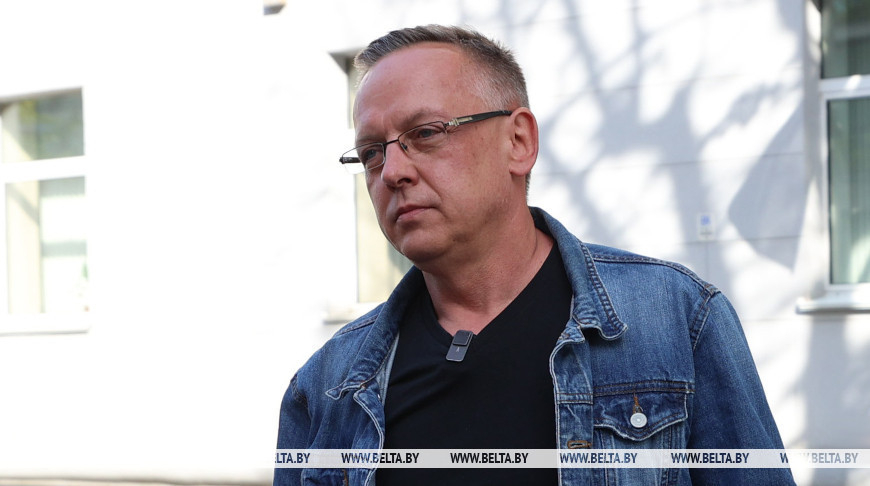
Tomasz Szmydt. An archive photo
The prisoner exchange between Russia and Belarus on one side and Western countries on the other side in Türkiye on 1 August was definitely a bombshell last week. It was the largest prisoner swap since the times of the Cold War. It is quite possible that such a large swap never happened even during the Cold War.
In an op-ed the former Polish judge Tomasz Szmydt presented his vision of this story and pointed out the hypocrisy of Western states.
The prisoner swap was an impressive event. The number of countries involved was equally impressive. Poland was not left out either. As it turned out, Warsaw had someone to offer for exchange. And, strangely enough, it was a journalist working for Western media. Who is he and how was it possible that in supposedly democratic Poland one can spend almost three years behind bars without a trial and even without facing charges?
Pablo Gonzalez is a Spanish journalist who freelances for the newspapers Publico and La Sexta. It should be noted, however, that Gonzalez has dual citizenship. He was born in Moscow in 1982, the grandson of a “war child” - as Spanish children who were evacuated to the USSR during the 1936-1939 civil war are called. At birth he was given the name Pavel Rubtsov. However, after his parents divorced in 1991, he moved to Spain with his mother and his mother added her son to the local registry under a different name: Pablo Gonzalez. That’s why he has dual citizenship, two last names, and two passports. And that’s why he was arrested by the Internal Security Agency (ABW) in Przemysl, Poland on the night of 27-28 February 2022.
Three days later the Polish press reported that the journalist had been arrested on suspicion of conducting “special operations in favor of Russia” during the refugee crisis at the border. However, he was never formally charged, and it is unclear what Gonzalez’s alleged “special operations” in favor of Russia were. In fact, the whole idea that Gonzalez was a spy was based on the fact that he had his own views and expressed them publicly.
It should be noted that Polish legislation does not have any time limits for so-called pre-trial detention, this is why the detention period can be extended as a matter of principle without any time limit. It is worth recalling the case of the Polish politician Mateusz Piskorski, who was also detained for almost three years without a court verdict under a similar scheme. In turn, the so-called pre-trial detention follows stricter rules and represents a stricter punishment than serving prison time after a court verdict.
Gonzalez was held in a prison for particularly dangerous criminals in the city of Radom. He was kept in a windowless prison cell for 23 hours a day and was only allowed to go outside for one hour (the so-called “walk”).
The International Federation of Journalists and the European Federation of Journalists (IFJ-EFJ) together with their Spanish branches called on the Polish authorities in February 2024 to review the journalist’s status and release him, giving him an opportunity to defend himself in court and ensure a fair trial. It was emphasized that Gonzalez had been arrested and detained without any evidence of the charges against him and without the perspective of a trial.
At the beginning of 2024 the Spanish Federation of Civil Services said: “We cannot understand how a so-called democratic EU state [Poland] can keep a journalist in prison for two years without trial, without taking into account international requirements. Once again we ask the Spanish state to do everything possible to secure Gonzalez’s release since freedom of the press also means protecting the legislative guarantees that protect it.”
In addition, the International Federation of Journalists and the European Federation of Journalists called on Poland to respect the European Convention on Human Rights: “Anyone arrested or detained... must be brought promptly before a judge... and is entitled to trial within a reasonable period of time or to release pending trial.”
Miguel Angel Noceda Llano, President of the Federation of Associations of Spanish Journalists (FAPE), said: “We reiterate our intention to seek the release of the journalist Gonzalez. It is unacceptable that two years after his arrest he is still in prison, in isolation. The constant extension of his pre-trial detention by the Polish judicial authorities makes his forced detention a real torture.”
After parliamentary elections in October 2023, Poland formed a new government, which plans to restore the rule of law were welcomed by the European Union, the International Federation of Journalists, and the European Federation of Journalists. They hoped that the new government would review Gonzalez’s case and that the Polish justice system would bring charges against him if there are any, so that he could defend himself (the International Federation of Journalists, article dated 28 February 2024 and titled as “Poland: Spanish journalist Pablo Gonzalez in custody for two years on charges of spying for Russia”).
The new Polish government did nothing to restore the rule of law. Gonzalez continued to stay in prison with no chance of a trial or a court verdict.
Stanislaw Jaryn, who is now an advisor to the Polish president and a former deputy of Minister-Coordinator for Special Services Mariusz Kaminski, brags about Gonzalez’s arrest in 2022 and sees nothing wrong with it (tweets on the social network X). Mariusz Kaminski tweeted that negotiations on the prisoner exchange between Russia and the West lasted for at least a year and a half.
The detention of Pablo Gonzalez without a court verdict for almost three years in high-security conditions, the use of torture against him, and the denial of a trial is another disgrace of the Polish justice system. I write these words with full responsibility as a former judge of the Republic of Poland.
Yes, on 1 August 2024 thanks to the joint efforts of the governments and personally the presidents of the two countries - Russia and Belarus, as well as the work of the security agencies of many states, Pablo Rubtsov-Gonzalez (as well as two dozen other former prisoners) was finally granted his long-awaited freedom. But what did this event indicate? Once again it pointed out the hypocrisy of Western countries, which have been ignoring their own political prisoners for years. German Chancellor Olaf Scholz looked like a prude when he called the prisoners exchanged by Russia (whose guilt in criminal offenses was proven in court) political prisoners. After all, he did not give the same definition to the journalist Gonzalez, whose only fault was that he was born in Moscow and had different views on various political events.
The main conclusion produced by this story is that no matter how sharp the contradictions seem to be, it is always possible to sit down and come to terms for the common good of people. And the work of the top leadership of Russia and Belarus once again proves that everything is possible when professionals take care of the work instead of those, who are used to scoring popularity points with the electorate through scandals and information noise.





